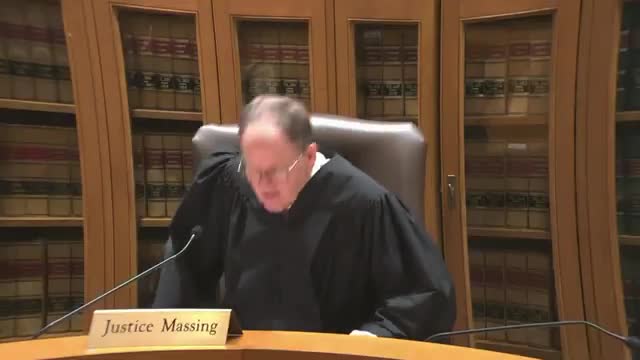Appeals panel weighs reliability of hearsay, expert risk opinions in sex-offender registry case
October 10, 2025 | Judicial - Appeals Court Oral Arguments, Judicial, Massachusetts
This article was created by AI summarizing key points discussed. AI makes mistakes, so for full details and context, please refer to the video of the full meeting. Please report any errors so we can fix them. Report an error »

A three-judge panel of the Massachusetts Appeals Court heard oral arguments on Oct. 10 in John Doe No. 526823 v. Offender Registry Board over whether the hearing examiner properly weighed hearsay evidence and an expert’s opinion in assigning a moderate degree of dangerousness.
The appeal centers on whether police, EMT and other reports introduced at the hearing were properly admitted and whether the board’s examiner erred in rejecting parts of Dr. Johnson’s expert assessment. Fred Burkholder, arguing for the petitioner, told the panel that objections to hearsay were raised in the administrative record and that the examiner relied on layered hearsay without explaining its reliability. “On pages 266 to 269 of the record…there is an objection that references hearsay,” Burkholder said during oral argument.
Christopher Bower, counsel for the board, responded that the hearsay objection at the hearing was general and that the examiner made a factual finding accepting parts of the victim’s statements and corroborating them with a conviction. Bower noted the examiner’s written decision recited the facts and addressed reliability in several parts of the ruling.
The panel also examined how Dr. Johnson, an expert on risk of reoffense, treated factors such as victim vulnerability and degree of physical contact. Justices asked whether an expert’s focus on recidivism risk could properly exclude factors bearing on dangerousness and whether the examiner adequately explained why it gave less weight to the expert’s mitigating conclusions. Counsel debated whether omitting a contested factor—factor 19, degree of physical contact—would have changed the examiner’s conclusion about moderate dangerousness.
Both sides cited administrative and case-specific guidance on evaluating expert testimony and hearsay in hearings of this type; the panel challenged counsel on whether the record contains an adequate explanation for overruling hearsay objections and on the extent to which the examiner articulated reasons for diverging from Dr. Johnson’s factor-by-factor analysis.
The court took the case under advisement after argument. The panel did not announce a decision at the session.
The dispute focuses on procedural and evidentiary points: whether statutory or regulatory standards for evaluating reliability and expert analysis were followed and whether the record contains sufficient explanation for the examiner’s determinations. The panel repeatedly pressed counsel to identify where the examiner tied particular factual findings to the legal standards it applied.
The appeals panel heard additional cases after this argument; no ruling was issued from the bench in Doe v. Offender Registry Board at the Oct. 10 session.
The appeal centers on whether police, EMT and other reports introduced at the hearing were properly admitted and whether the board’s examiner erred in rejecting parts of Dr. Johnson’s expert assessment. Fred Burkholder, arguing for the petitioner, told the panel that objections to hearsay were raised in the administrative record and that the examiner relied on layered hearsay without explaining its reliability. “On pages 266 to 269 of the record…there is an objection that references hearsay,” Burkholder said during oral argument.
Christopher Bower, counsel for the board, responded that the hearsay objection at the hearing was general and that the examiner made a factual finding accepting parts of the victim’s statements and corroborating them with a conviction. Bower noted the examiner’s written decision recited the facts and addressed reliability in several parts of the ruling.
The panel also examined how Dr. Johnson, an expert on risk of reoffense, treated factors such as victim vulnerability and degree of physical contact. Justices asked whether an expert’s focus on recidivism risk could properly exclude factors bearing on dangerousness and whether the examiner adequately explained why it gave less weight to the expert’s mitigating conclusions. Counsel debated whether omitting a contested factor—factor 19, degree of physical contact—would have changed the examiner’s conclusion about moderate dangerousness.
Both sides cited administrative and case-specific guidance on evaluating expert testimony and hearsay in hearings of this type; the panel challenged counsel on whether the record contains an adequate explanation for overruling hearsay objections and on the extent to which the examiner articulated reasons for diverging from Dr. Johnson’s factor-by-factor analysis.
The court took the case under advisement after argument. The panel did not announce a decision at the session.
The dispute focuses on procedural and evidentiary points: whether statutory or regulatory standards for evaluating reliability and expert analysis were followed and whether the record contains sufficient explanation for the examiner’s determinations. The panel repeatedly pressed counsel to identify where the examiner tied particular factual findings to the legal standards it applied.
The appeals panel heard additional cases after this argument; no ruling was issued from the bench in Doe v. Offender Registry Board at the Oct. 10 session.
View full meeting
This article is based on a recent meeting—watch the full video and explore the complete transcript for deeper insights into the discussion.
View full meeting
